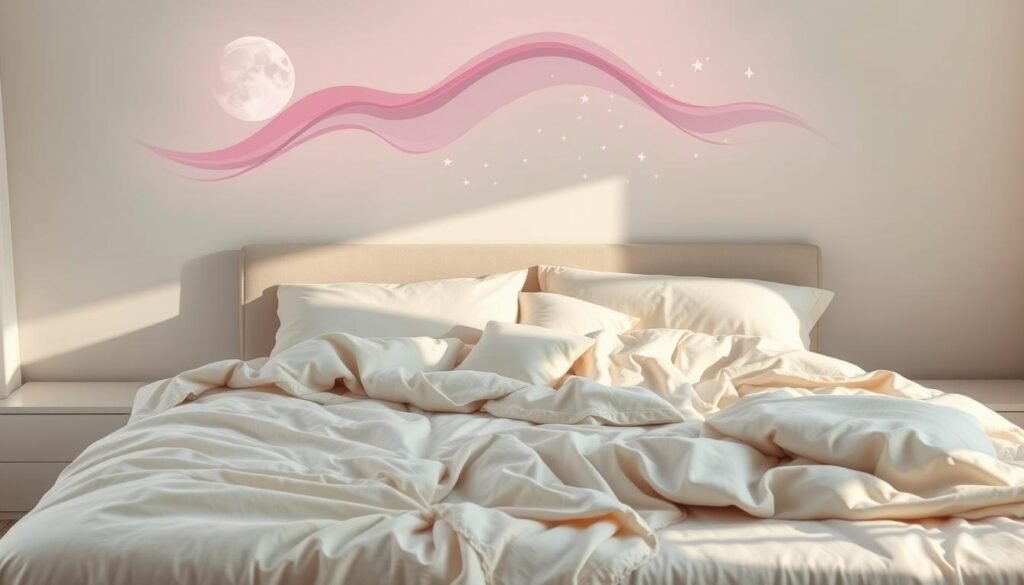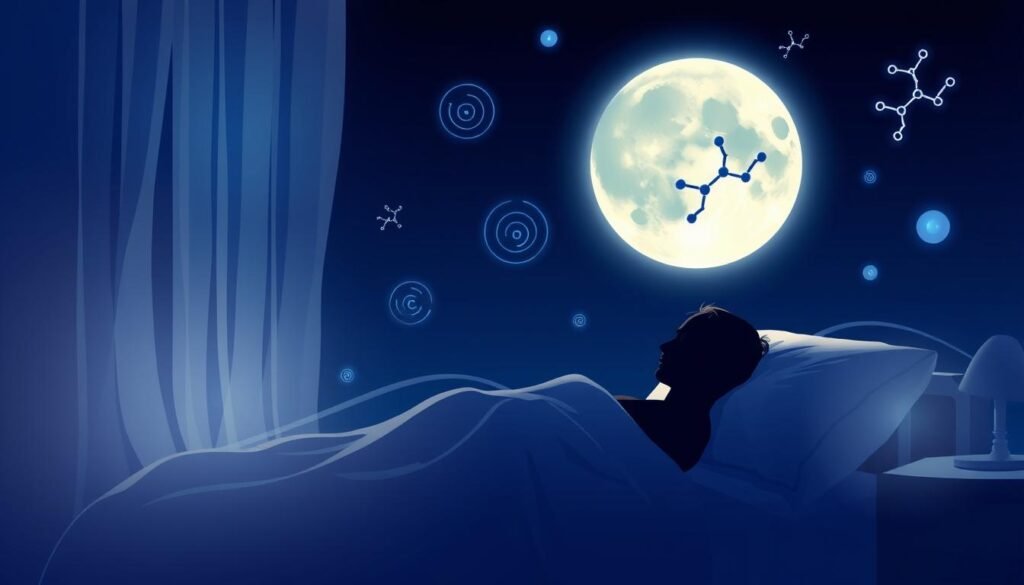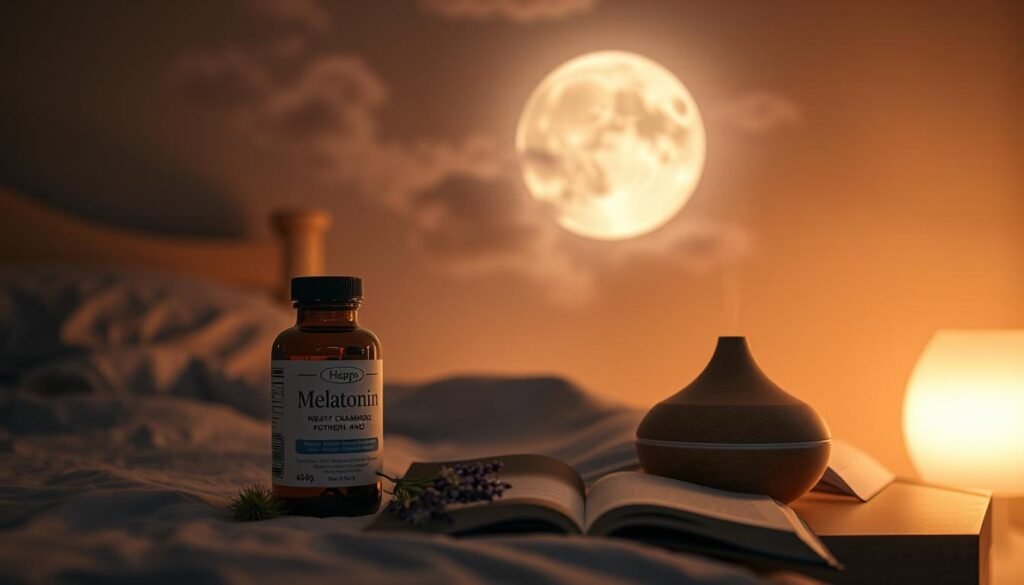About 70% of women with premenstrual dysphoric disorder (PMDD) have trouble sleeping before their period. Insomnia is more common for women with PMS. They often look for natural sleep solutions. Melatonin stands out as a safe choice. It helps fix sleep cycles upset by hormone changes. Let’s look at how melatonin can help with PMS-related insomnia. We’ll see what it does and how it can benefit you.
Key Takeaways
- Melatonin is a hormone that regulates sleep and may alleviate PMS insomnia.
- Up to 70% of women with PMDD report significant sleep disturbances.
- Insomnia rates double for women experiencing PMS symptoms.
- Melatonin serves as a natural sleep aid without the adverse effects of prescription medications.
- Consistent sleep schedules and lifestyle changes can enhance melatonin’s effectiveness.
Understanding PMS and Its Impact on Sleep
Premenstrual syndrome (PMS) and premenstrual dysphoric disorder (PMDD) disrupt many people’s sleep. They suffer from physical discomfort and changes in emotional health. This can lead to trouble sleeping, especially during some phases of the menstrual cycle. It’s key to understand how these affect sleep.
The phases of the menstrual cycle
The menstrual cycle has a few phases: menstruation, follicular, ovulation, and luteal. During the luteal phase, symptoms like bloating, headaches, and mood swings are common. These issues are worse right before menstruation and can greatly disturb sleep. Studies show that insomnia is more common when getting close to the period, with 1 in 10 affected by it.
How PMS affects physical and emotional health
About 70% of women with PMDD face sleep problems. Severe PMS symptoms make insomnia and tiredness worse during the day. The worst sleep and mood problems happen 4 to 5 days before menstruation and the first few days of it.
Changes in hormones like estrogen and progesterone impact sleep for those sensitive to them. Knowing more about these hormonal shifts can offer ideas for coping and making lifestyle changes. This can help ease PMS symptoms, improving both emotional health and sleep quality.
The Connection Between Hormones and Sleep
It’s key to know how hormones and sleep interact, especially for those with insomnia. Changes in hormones during the menstrual cycle can change how well you sleep. Estrogen and progesterone are two hormones that really matter here. They change a lot during the luteal phase and influence sleep quality a big deal.
The role of estrogen and progesterone in sleep disturbances
Estrogen impacts how you feel and your sleep patterns. If it goes up and down, you might feel more anxious or upset. This can make sleeping hard. When progesterone goes up during the luteal phase, your body gets warmer. This can make you uncomfortable and mess with your sleep. Also, during this time, you might not get enough REM sleep. REM sleep is important because it helps you feel rested.
How hormonal fluctuations affect sleep quality
Hormone changes can really mess with your sleep. Women with PMS often have lower progesterone. This can make it hard to sleep because it lowers GABA receptor activity, which helps you relax. If you have PMS, you might also have melatonin timing issues, linked to less serotonin. Melatonin supplements, checking your hormone levels, and making lifestyle changes can help with these sleep problems.

| Hormone | Role in Sleep | Effects of Fluctuations |
|---|---|---|
| Estrogen | Regulates mood and promotes restorative sleep | Fluctuating levels can lead to anxiety and insomnia |
| Progesterone | Induces sleepiness and regulates body temperature | Higher levels can disrupt sleep architecture, reducing REM sleep |
| Melatonin | Controls sleep-wake cycles | Abnormal secretion may lead to insomnia, especially in PMS |
| GABA | Promotes relaxation and sleep | Lower activity in PMS can increase sleep disturbances |
What is Melatonin?
The hormone called melatonin is very important for our sleep. It’s made in the brain and tells us when to sleep. It starts working when it gets dark, helping us rest and recover. This is especially true for people who have trouble sleeping because of PMS. Knowing how melatonin helps can lead to better sleep.
The natural sleep hormone explained
Melatonin is a hormone that keeps our sleep patterns on track. Our sleep can be affected by the light we see, which changes our sleep habits. For women with PMS, melatonin is key to relaxing and sleeping well. Adding more melatonin can help when your body is not making enough during these times.
How melatonin regulates sleep cycles
Melatonin is important for managing our sleep by working with the brain. It helps us sleep deeply, which PMS can mess up. Taking 3-6 mg of melatonin every night may help make your sleep routine more regular. Learning how melatonin works shows it could be a natural choice for easing sleep problems during PMS.

| Aspect | Melatonin Role | Effects Without Melatonin |
|---|---|---|
| Regulation of Sleep Cycles | Promotes synchronization | Irregular patterns |
| Response to Darkness | Signals sleep onset | Difficulty falling asleep |
| PMS Influence | Balances hormonal effects | Heightened insomnia symptoms |
| Typical Dosage | 3-6 mg nightly | Potential sleep struggle |
Melatonin for PMS Insomnia: Mechanisms of Action
Exploring the role of melatonin in treating PMS insomnia starts with its effect on hormone balance. Women facing premenstrual dysphoric disorder, or PMDD, notice their sleep suffers with hormonal changes. Melatonin helps regulate hormones and improve sleep. Studies show melatonin not only fixes sleep patterns but also balances hormones during the luteal menstrual phase.
How melatonin helps in regulating hormonal imbalances
Studies find that melatonin boosts its levels in those with PMDD, aiding sleep. It works via receptors in the brain, affecting important sleep hormones. Symptoms in the luteal phase, like lower melatonin levels, suggest the benefit of supplemental melatonin for balance and sleep relief during PMS.
Influence on brain neurotransmitters and sleep architecture
Melatonin also affects GABA, a neurotransmitter that helps with relaxation and lowering PMS-linked anxiety. Besides, it influences circadian genes to modify sleep patterns. These effects combine to enhance the quality of sleep, supporting restful nights during PMS times. For deeper understanding, consider reviewing clinical studies and biological insights on melatonin.

| Factor | Impact on Sleep | Details |
|---|---|---|
| Hormonal Levels | Fluctuations | PMDD women show significant hormonal changes affecting sleep. |
| Melatonin Secretion | Decreased | Lower levels during symptomatic luteal phase contribute to insomnia. |
| Neurotransmitter Activity | Enhanced | Melatonin boosts GABA effectiveness, promoting relaxation. |
| Sleep Architecture | Improving | Melatonin aids in restoring normal sleep architecture disrupted by hormonal imbalances. |
Benefits of Melatonin as a Natural Sleep Aid
Melatonin works well as a natural sleep aid, especially during the luteal phase of the menstrual cycle. This phase can cause sleep issues. So, taking melatonin is key for better sleep quality improvement.
Improved sleep quality during the luteal phase
Studies show melatonin helps improve sleep quality improvement in the luteal phase. It makes sleep deeper and more restorative. People often see a drop in insomnia symptoms, leading to more restful sleep.
The increase in melatonin can also extend sleep time and enhance sleep patterns. This is especially useful during the luteal phase of the menstrual cycle.
Reduced symptoms of anxiety and depression
Melatonin isn’t just for better sleep; it also reduces anxiety and eases depressive symptoms linked to PMS. It helps balance emotions, which can improve life quality. Those using melatonin supplements usually find significant relief from daily disturbances. This leads to a calmer and more focused state of mind.
| Benefit | Description |
|---|---|
| Enhanced Sleep Quality | Melatonin aids in achieving deeper and longer sleep, particularly beneficial during PMS. |
| Anxiety Reduction | Helps alleviate anxiety symptoms, creating a more relaxed mental state. |
| Improvement in Depressive Symptoms | May reduce feelings of sadness or depression, promoting emotional balance. |
| Support for Luteal Phase | Addresses specific sleep disturbances occurring during this critical phase of the menstrual cycle. |
Research Evidence Supporting Melatonin Use
Recent studies highlight melatonin’s benefits for premenstrual symptoms and insomnia. Many clinical trials focused on how well melatonin can help with sleep problems. These problems often happen with hormone changes in PMS and PMDD.
Clinical studies on melatonin and PMS/PMDD
An examination of 35 randomized trials found 83% high in quality. This evidence shows melatonin greatly enhances sleep for those with severe premenstrual symptoms. About 5.2% of NHIS survey participants use melatonin. Of these, 27.5% say it helps with their insomnia, indicating a high interest in melatonin for sleep issues.
Effects on sleep disturbances related to hormonal changes
Studies with military members reveal significant sleep issues related to hormonal changes. For instance, 40% of some US Air Force Airmen faced sleep problems. As many as 75% had worse sleep quality while deployed than at home. Additionally, more than 25% of 14,148 Army members called themselves “poor” sleepers. This shows a crucial need for effective treatments.
Melatonin could help these individuals by fixing their sleeping patterns. Its benefits are tied to adjusting the body’s internal clock. This is vital for people with shift work issues or delayed sleep-wake phase disorder. With more kids and teens using melatonin, research on its safe use must go on.
Practical Tips for Using Melatonin
Using melatonin the right way can make your sleep much better. This is especially true if you have trouble sleeping before your period. It’s important to know how much melatonin to take and when to take it. This helps create a good sleep routine.
Recommended dosage and timing
Start with a small amount, 1-2 milligrams, about 30 minutes before you go to bed. If you need to, you can slowly increase how much you take. Stay within safe limits. You shouldn’t take more than 10 milligrams at once.
Combining melatonin with other natural remedies
Melatonin works even better when you add other natural remedies. Doing things like reading before bed, staying away from screens, and keeping your sleeping space cozy can help too. Here are a few tips:
- Make sure your sleeping area is quiet, dark, and comfy.
- Avoid caffeine and big meals before bedtime.
- Try herbal teas, like chamomile or valerian root, to help you sleep.
- Use mindfulness or relaxation techniques to calm anxiety.
Creating a regular sleep routine, along with melatonin and natural methods, can really improve your sleep. You might also notice your hormones becoming more balanced.
| Age Group | Recommended Melatonin Dosage |
|---|---|
| Preschool Children | 1 to 2 mg |
| School-aged Children | 1 to 3 mg |
| Adolescents | 1 to 5 mg |
| Adults | 1 to 10 mg |
| Seniors (aged 65+) | Consult a doctor |
Alternative Approaches to Managing PMS Insomnia
PMS insomnia can be tough to deal with. Luckily, there are several alternative methods to help improve sleep. By looking into various options, we get a complete view on handling sleep issues due to PMS. This part will discuss natural supplements and lifestyle changes that better sleep quality and aid in PMS management.
Other natural supplements for sleep support
Many look towards natural sleep aids for a peaceful night. Magnesium is a standout because it may ease muscles and calm the mind. Chamomile tea is known for its calming effects. Valerian root, used for ages, helps with relaxation and better sleep. Adding these supplements to your nighttime routine can help fight insomnia from PMS.
Lifestyle changes to enhance sleep quality
Making lifestyle changes is key to better sleep. Exercising regularly boosts health and improves sleep. Using relaxation techniques such as deep breathing, meditation, or yoga helps reduce stress. It’s important during the luteal phase.
Having a regular sleep schedule also aids. This means going to bed and waking up at the same time every day. It supports the body’s natural sleep cycle. Combining these changes with natural sleep aids forms a strong plan against PMS insomnia. For more behavior tips, check out this resource.
Conclusion
Melatonin is a hopeful natural choice for battling PMS insomnia. It helps roughly 5.3% of women who suffer badly from insomnia and depression. Looking into effective PMS insomnia solutions is very important. Knowing about hormones and their effects on sleep during your period is key to better sleep. Also, using melatonin can greatly improve sleep quality enhancement and emotional wellness.
Studies back up the good things melatonin does, especially in making sleep better. It’s shown to help those with sleep cycle issues sleep better. This is great news for those feeling down during their luteal phase. Melatonin, as part of a whole health plan, can lead to better sleep habits and a happier life.
Adding other calming methods and changing what you eat can boost melatonin’s effects. Including magnesium might be a good idea. For more on this, check out the role of magnesium in sleep. This can give more ways to fight PMS sleep troubles.